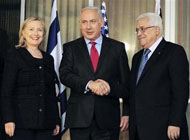This week, most Palestinians tuned in to events of the rapidly moving negotiations, which began on September 2 in Washington and have already been through two more rounds in Sharm Al Sheikh and Jerusalem. While no real progress has been made, or at least announced, US mediators say the talks are moving positively and both sides are determined to reach peace.
The Sharm Al Sheikh summit, which took place on September 14 ran all of two hours but is said to have broached the core issues of the conflict such as settlements, borders and refugees. Israel has so far not committed itself to extending the 10-month moratorium on settlement construction, set to end on September 26 but Israeli Prime Minister Benjamin Netanyahu and his advisors have hinted that a compromise could be reached on the issue, such as a three-month extension on the freeze in some settlements. President Mahmoud Abbas had earlier said he would quit talks if Israel resumed settlement construction.
On September 15, just a day after Sharm Al Sheikh, the talks moved to Jerusalem, where US Secretary of State Hillary Clinton met with Netanyahu and Abbas at the Israeli premier’s residence in the western sector of the city. The parties discussed final status issues but reached no final agreement on any of them. Clinton, however, expressed optimism about the prospect of reaching a peace. “This is the time, and these are the leaders,” Clinton said.
Clinton also met with Israeli President Shimon Peres before traveling to Ramallah to meet with Abbas in his headquarters there. Clinton urged both sides to seize what she said was a “moment of opportunity.”
In Ramallah Abbas told the press that the US was playing a pivotal role in peace. "Unwavering American commitments and the tireless efforts give us hope that we will reach peace," he said. While Abbas acknowledged the obstacles and the “difficult times” the negotiations were taking place in, he also felt the only way to a solution was through the negotiating process. “We all know that there is no alternative to peace other than negotiating peace, so we have no alternative but to continue peace efforts."
In the meantime, the Palestinian leadership is shoring up support for its negotiating stance ahead of President Abbas’ scheduled appearance before the United Nations General Assembly next week. According to the Israeli press, Abbas and the negotiating team want to be interviewed by the Jewish press in order to win over some support for their negotiating stance.
Unfortunately, talk is cheap and actions certainly speak louder than words. Israel’s control over the Palestinians in the occupied territories is as strong as ever. On September 17, Israeli authorities imposed a military closure on the West Bank for the Yom Kippur holiday, also banning Muslim worshippers in Hebron from praying in the Ibrahimi Mosque so as to let the city’s Jewish settlers have free access to the Jewish section of the tomb.
The week was not without Israeli-caused Palestinian deaths either. On September 15, 23-year old Wajdi Al Qadi was killed in an Israeli air strike on Rafah smuggling tunnels. Two other men were injured.
Then on September 17, Israeli army forces stormed the Tulkarm-area refugee camp of Nur Shams, blasted open the door of 38-year old Iyad Shalabiyeh and shot him in his bedroom three times in the neck and chest. Shalabiyeh, who is a Hamas activist, was alone in his home when the army stormed the house and opened fire, killing him instantly. Eyewitness refused the Israeli army version of the assassination which said Shalabiyeh ran suspiciously towards the soldiers, who felt their lives were in danger.
Prime Minister Salam Fayyad condemned the assassination, saying it was a "dangerous escalation that weakened the credibility of the already fragile political process." Fayyad added that by the Israeli army’s raid of a Palestinian area located in Area A, Israel had again "turned back on what is required.” Hamas for its part has vowed to avenge Shalabiyeh’s death.
The Islamic movement has also taken a strong stance against the return to direct talks, openly declaring their intention to try and foil them. As a result, Palestinian Authority forces have begun to round up Hamas activists in the West Bank, with 53 men reportedly arrested on the night of September 17 alone.
As for settlements, the US is reportedly pushing the Israelis to extend its settlement freeze, with Clinton telling Israel’s Channel 10 that she doesn’t think “a limited extension will not undermine the process going forward if there were a decision agreed to by both parties." On September 13, Clinton was even clearer, echoing US President Barack Obama’s stance by saying the US believed the moratorium should be extended. However, Israel has yet to commit to anything concrete, with a US proposal such as a three-month extension reportedly on the table.
On the contrary, settlers in the northern West Bank continued to take over more land belonging to Palestinian villages such as Qaryout. So far, settlers have taken over dozens of dunams of farmland.
Furthermore, on September 13, the Israeli Peace Now movement stated that even if Israel continued fully with its so-called freeze, at least 13,000 housing units would still be built once the freeze is over without having to get further government approval. "If the government decides on a de facto 'tacit freeze,' and commits not to approve new construction but without renewing the freeze order, the settlers can still build 13,000 housing units, 5,000 of which are in isolated settlements east of the separation barrier," the movement stated.








